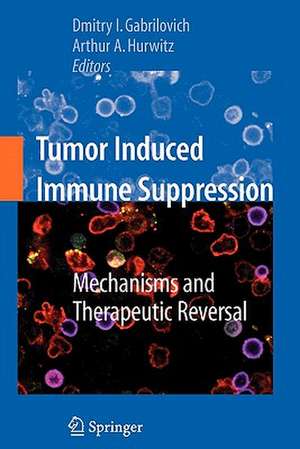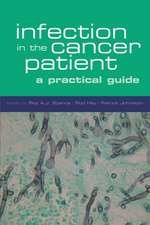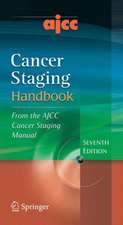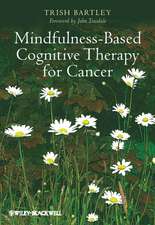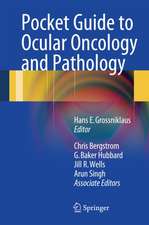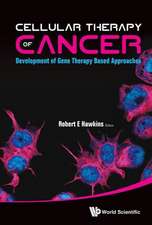Tumor-Induced Immune Suppression: Mechanisms and Therapeutic Reversal
Editat de Dmitry I. Gabrilovich, Arthur Andrew Hurwitzen Limba Engleză Paperback – 29 oct 2010
| Toate formatele și edițiile | Preț | Express |
|---|---|---|
| Paperback (2) | 1088.92 lei 43-57 zile | |
| Springer – 29 oct 2010 | 1088.92 lei 43-57 zile | |
| Springer – 27 aug 2016 | 1419.76 lei 43-57 zile | |
| Hardback (1) | 1424.89 lei 43-57 zile | |
| Springer – 10 feb 2014 | 1424.89 lei 43-57 zile |
Preț: 1088.92 lei
Preț vechi: 1146.23 lei
-5% Nou
Puncte Express: 1633
Preț estimativ în valută:
208.36€ • 218.13$ • 172.41£
208.36€ • 218.13$ • 172.41£
Carte tipărită la comandă
Livrare economică 07-21 aprilie
Preluare comenzi: 021 569.72.76
Specificații
ISBN-13: 9781441924001
ISBN-10: 1441924000
Pagini: 312
Ilustrații: X, 302 p.
Dimensiuni: 155 x 235 x 16 mm
Greutate: 0.44 kg
Ediția:2008
Editura: Springer
Colecția Springer
Locul publicării:New York, NY, United States
ISBN-10: 1441924000
Pagini: 312
Ilustrații: X, 302 p.
Dimensiuni: 155 x 235 x 16 mm
Greutate: 0.44 kg
Ediția:2008
Editura: Springer
Colecția Springer
Locul publicării:New York, NY, United States
Public țintă
ResearchCuprins
Immune-Suppressive Mechanisms and Cancer: Understanding the Implications, Paradoxes, and Burning Questions.- Mechanisms of Tumor-Associated T-Cell Tolerance.- Contribution of B7-H1/PD-1 Co-inhibitory Pathway to T-Cell Dysfunction in Cancer.- Regulatory T Cells in Cancer.- Cancer-Induced Signaling Defects in Antitumor T Cells.- Immunobiology of Dendritic Cells in Cancer.- Macrophages and Tumor Development.- Myeloid-Derived Suppressor Cells in Cancer.- Signaling Pathways in Antigen-Presenting Cells Involved in the Induction of Antigen-Specific T-Cell Tolerance.- Arginine Availability Regulates T-Cell Function in Cancer.- Protein–Glycan Interactions in the Regulation of Immune Cell Function in Cancer: Lessons from the Study of Galectins-1 and -3.- Role of Reactive Oxygen Species in T-Cell Defects in Cancer.- Tumor Stroma and the Antitumor Immune Response.
Recenzii
From the reviews:
"The overall goal of this book is to describe what is currently known about the ways tumors circumvent destruction by the host’s immune system. … The book is targeted at researchers -- immunologists in general and, more specifically, tumor immunologists. It also provides a good source of information for graduate students and postdoctoral fellows. The editors of the book and the authors of the chapters are authorities in the areas they discuss. … a useful addition to the field." (Marion C. Cohen, Doody’s Review Service, August, 2008)
"The overall goal of this book is to describe what is currently known about the ways tumors circumvent destruction by the host’s immune system. … The book is targeted at researchers -- immunologists in general and, more specifically, tumor immunologists. It also provides a good source of information for graduate students and postdoctoral fellows. The editors of the book and the authors of the chapters are authorities in the areas they discuss. … a useful addition to the field." (Marion C. Cohen, Doody’s Review Service, August, 2008)
Textul de pe ultima copertă
Tumor Induced Immune Suppression: Mechanisms and Therapeutic Reversal focuses on the critical question of tumor biology: "Why can tumors escape immune system control?" It also addresses one of the most important problems within the field of clinical oncology: the lack of efficient cancer vaccines. Edited by Dmitry Gabrilovich and Andy Hurwitz, the book is the first attempt at a systematic and comprehensive analysis of the various immunosuppressive mechanisms in cancer. This analysis includes information on:
This book should be of high interest for researchers in the fields of tumor immunology and general immunology, as well as for those who are involved in clinical oncology and cancer immunotherapy.
- Different surface molecules that mediate T-cell suppression in cancer;
- The specific roles of dendritic cells, macrophages, and myeloid-derived suppressor cells in tumor non-responsiveness;
- The contribution of regulatory T cells in the inability of immune systems to mount antitumor response;
- The role of T-cell signaling and different metabolic pathways in tumor-associated immune suppression.
This book should be of high interest for researchers in the fields of tumor immunology and general immunology, as well as for those who are involved in clinical oncology and cancer immunotherapy.
Caracteristici
Presents a comprehensive overview of different mechanisms of immune dysfunction Discusses a number of new mechanisms that have never been discussed in a monogragraph report including: T-cell inhibitory molecules and regulatory tolergenic DCs Focus on therapeutic correction of the observed abnormalities
